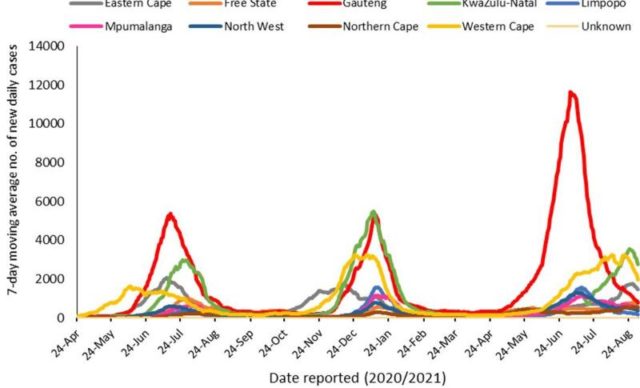The NICD reported 9 544 new cases with the majority of them in KwaZulu-Natal
DURBAN – AS OF Wednesday, there has been an increase in hospital admissions in relation to Covid-19.
This was according to the National Institute for Communicable Diseases (NICD) which released the latest Covid-19 confirmed cases on Wednesday night.
The NICD said that in private and public facilities (664) there have been 410,201 admissions to date, 88 058 deaths and 12 408 people were admitted.
“Today the institute reports 9 544 new Covid-19 cases that have been identified in South Africa, which brings the total number of laboratory-confirmed cases to 2 787 203. This increase represents a 15.6% positivity rate. As per the National Department of Health, a further 235 Covid-19 related deaths have been reported, bringing total fatalities to 82 496 to date,” the NICD said on Wednesday.
The majority of new cases today are from KwaZulu-Natal (28%), followed by Western Cape (21%). Eastern Cape accounted for 15%; Free State accounted for 10%; Gauteng Province accounted for 9%; Northern Cape accounted for 6%; Mpumalanga accounted for 5%
“North West accounted for 4%; and Limpopo Province accounted for 2% of today’s new cases.”
In relation to the seven-day moving average number of new cases, the NICD said the total number of cases on Wednesday (9 544) was higher than Tuesday (7 086) and higher than the average number of new cases per day over the 7 preceding days ( 9 286).
“The seven-day moving average daily number of cases has decreased.”
Meanwhile, researcher with the Department of Basic Education Professor Martin Gustafsson said there was a good review from earlier this year of research studies around the world which did not point to schools being strong centres of transmission of Covid-19.
“Nor do these point to schools being particularly effective at reducing transmission relative to allowing learners to be at home instead of school.
“There’s no clear evidence pointing either way so having our children in schools does not, from the data, encourage transmission and conversely keeping them at home does not decrease transmission either but this was in a context where we have reduced class sizes. ”
Gustafsson said closing schools was a weak non-pharmaceutical intervention.
Daily News








